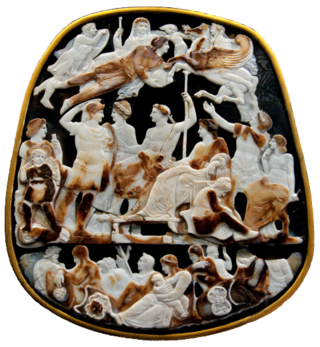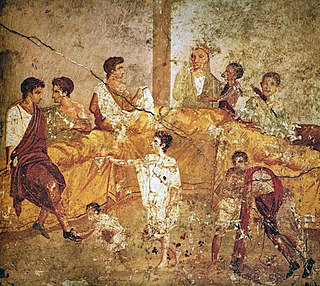
The Julio-Claudian dynasty comprised the first five Roman emperors: Augustus, Tiberius, Caligula, Claudius, and Nero.

The gens Petronia was a plebeian family at ancient Rome. This gens claimed an ancient lineage, as a Petronius Sabinus is mentioned in the time of Lucius Tarquinius Superbus, the last of the Roman kings, but few Petronii are mentioned in the time of the Republic. They are frequently encountered under the Empire, holding numerous consulships, and eventually obtaining the Empire itself during the brief reign of Petronius Maximus in AD 455.

Lucius Aelius Sejanus, commonly known as Sejanus, was a Roman soldier, friend, and confidant of the Roman Emperor Tiberius. Of the Equites class by birth, Sejanus rose to power as prefect of the Praetorian Guard, of which he was commander from AD 14 until his execution for treason in AD 31.

The gens Claudia, sometimes written Clodia, was one of the most prominent patrician houses at ancient Rome. The gens traced its origin to the earliest days of the Roman Republic. The first of the Claudii to obtain the consulship was Appius Claudius Sabinus Regillensis, in 495 BC, and from that time its members frequently held the highest offices of the state, both under the Republic and in imperial times.

The gens Julia was one of the most prominent patrician families in ancient Rome. Members of the gens attained the highest dignities of the state in the earliest times of the Republic. The first of the family to obtain the consulship was Gaius Julius Iulus in 489 BC. The gens is perhaps best known, however, for Gaius Julius Caesar, the dictator and grand uncle of the emperor Augustus, through whom the name was passed to the so-called Julio-Claudian dynasty of the first century AD. The nomen Julius became very common in imperial times, as the descendants of persons enrolled as citizens under the early emperors began to make their mark in history.

Drusus Julius Caesar was the son of Emperor Tiberius, and heir to the Roman Empire following the death of his adoptive brother Germanicus in AD 19.
Publius Pomponius Secundus was a distinguished statesman and poet in the reigns of Tiberius, Caligula, and Claudius. He was suffect consul for the nundinium of January to June 44, succeeding the ordinary consul Gaius Sallustius Crispus Passienus and as the colleague of the other ordinary consul, Titus Statilius Taurus. Publius was on intimate terms with the elder Pliny, who wrote a biography of him, now lost.
Gaius Sallustius Passienus Crispus was a prominent figure in the Roman Empire during the first century. He held the consulship twice, and was stepfather of the future emperor Nero.
Quintus Pomponius Secundus was a Roman aristocrat of the first century, and consul suffectus in AD 41 as the colleague of Gnaeus Sentius Saturninus. His brother was the poet and statesman Publius Pomponius Secundus, and their half-sister, Milonia Caesonia, was the second wife of the emperor Caligula.

Vistilia was a Roman matron of the gens Vistilia known by her contemporaries for having seven children by six different husbands; Pliny the Elder was more impressed by the fact most of her pregnancies were remarkably brief. Five of her sons became consuls, her daughter Milonia Caesonia became Roman empress through her marriage to Caligula, and her granddaughter Domitia Longina became empress through her marriage with Domitian. Due to her fertility Vistilia became a byword for prodigious fecundity in antiquity.
The gens Calvisia was an ancient Roman family, which first rose to prominence during the final decades of the Republic, and became influential in imperial times. The first of the gens to obtain the consulship was Gaius Calvisius Sabinus in 39 BC.

The gens Vibia was a plebeian family at ancient Rome. Although individuals named Vibius appear in history during the time of the Second Punic War, no members of this gens are found at Rome until the final century of the Republic. The first of the Vibii to obtain the consulship was Gaius Vibius Pansa in 43 BC, and from then until imperial times the Vibii regularly filled the highest offices of the Roman state. The emperors Trebonianus Gallus and Volusianus each claimed descent from the family.
Gaius Memmius Regulus was a first-century Roman senator. He was ordinary consul in AD 63, with Lucius Verginius Rufus as his colleague.
Publius Memmius Regulus was a Roman senator active during the reign of the emperor Tiberius. He served as consul suffectus from October to December AD 31 with Lucius Fulcinius Trio as his colleague, governor of Achaea from AD 35 to 44, and governor of Asia possibly in AD 48-49.
Servius Cornelius Scipio Salvidienus Orfitus was a Roman senator, and consul ordinarius for the year 51, as the colleague of the emperor Claudius. His father Orfitus was one of the seven sons of Vistilia, a noblewoman who came from a family that had held the praetorship, although some have erroneously stated Servius himself was the husband of Vistilia. He became a member of the gens Cornelia through adoption by an otherwise unknown Servius Cornelius Scipio.
LuciusFulcinius Trio was a Roman senator who came from a plebeian family. Trio was an active prosecutor (delator) during the reign of Tiberius who developed a reputation for making accusations. He was governor of Lusitania from about 21 to 31, before returning to Rome to hold the office of consul suffect with Publius Memmius Regulus in 31. His friendship with Sejanus would lead to allegations that ended with his suicide in early 35.
Lucius Annius Vinicianus was a Roman senator during the Principate. He is best known for his involvement in the assassination of Caligula and a rebellion against Claudius.







